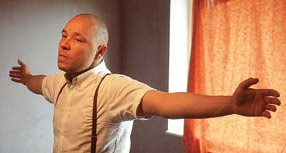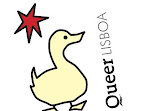

Director: George Bamber.
Principal cast: Daniel Letterle, Diego Serrano, Shanola Hampton, David Monahan.
„The Mostly Unfabulous Social Life of Ethan Green” is a gay romantic comedy based on the comic strips of the same name by Eric Orner who is also one of the film’s two scriptwriters. It is also George Bamber’s first accomplishment as director after having worked on more than 20 films as assistant director including such blockbusters as „Men in Black II” and „Jeepers Creepers”. And let me put it this way from the very beginning– he never had any ambitions of joining the likes of Derek Jarman or Eytan Fox with this well-acted and light situation comedy.
As the film’s title suggests, the plot evolves around Ethan Green and his not so fabulous social life. And social life it is as we never actually see him go to work or do any other "meaningful" things that are usually required in any society. However, it doesn’t seem too much out of place as nobody else really seems to be doing any work in this comic universe (even the people who are supposed to be working, like Sunny Deal, a real estate agent charged with the job of selling Ethan’s house). All the characters we come across are pretty much concerned with one thing only - their social lives. In the opening scene we see Ethan reading a book titled „Finding a Boyfriend Within” in a park only to be struck by a ball in the head seconds later. The perpetrator rushes to Ethan’s help and next thing we know is that Ethan’s got a new boyfriend, Kyle. Having a boyfriend as opposed to being married to a woman might be a novelty to the latter, but it’s definitely old news for our hero Ethan. For he has had many of the kind. It doesn’t take long before we’re introduced to two of them: the book store clerk Leo with whom he initially had moved together after their only third date and the camp Latino twink Juarez who for the past 5 years has been living with Ethan’s mother (an unexpected reunion with Meredith Baxter aka the mom from „The Family Ties”). Add to this lot Charlotte, his lesbian housemate, Chester, a gay Republican who is now dating Leo, the two cross-dressing Hat Sisters (played by such unlikely cast as Richard Riehle and Joel Brooks) and a sexually hyperactive twink called Punch, and I think you’ll get the picture. The film’s main theme is what our hero’s mom calls „the Ethan reflex” – his inability to commit himself, his constant search for the „dream date”, a concept which, as we are told through his flashbacks, has haunted him since his childhood’s slumber parties with some pretty mean girls. In his mind he is still playing that game with the purpose of proving to them that he isn’t the loser they wanted him to be. The film’s quite eventful plot takes him on a bumpy ride with the single purpose of showing him that the only way to win the game is to stop playing it.
There is nothing particularly novel in this film. In many ways this is a standard American comedy which is both reminiscent of something like the TV series „Scrubs” with its own main character’s „mostly unfabulous social life” and the numerous romantic (mostly teen-oriented) comedies that have come out of the USA lately. They bear much resemblance both in style and visual execution. What mostly sets this film apart from the others is that it’s about gay relationships. And although many people will find this film a bit too shallow and not entirely realistic, they should also remember that romantic comedies are rarely anything but. The film does contain quite a few gay clichés and most characters will seem over the top, but there is never smoke without a fire and you can hardly expect a film which is based on comic strips to portray average folk with average personalities. Nor does this film deal with the issues of coming out, being accepted by friends and family, having to fight against discrimination or anything like that. And thank God for that! The universe in „The Mostly Unfabulous Social Life of Ethan Green” is a gay normality where its characters don’t fall victims to hate crimes or commit suicide, don’t have to struggle to come out to their parents or workmates. They simply live their gay lives dealing with their relationship problems in a world where their sexuality isn’t suppressed by heteronormativity. In that respect, it’s a relief that not all gay-themed films have to be Greek tragedies and a good omen that a former star of one of the most popular American TV sitcoms about „family values” here plays a mother who isn’t just accepting her son’s sexuality but also tries to help him with his relationship problems. It’s also a cheerful comedy which made me smile with recognition, laugh at the jokes and get a tear in my eye in the end. This film clearly targets a gay audience and can be at times difficult to fully appreciate for a non-gay audience, but I think it will make an enjoyable and light-hearted viewing for most non-homophobic audiences.












